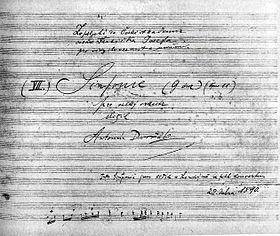Symphony No. 8 (Dvořák)
| Symphony No. 8 | |
|---|---|
| by Antonín Dvořák | |

Title page of the autograph score
|
|
| Key | G major |
| Catalogue |
|
| Style | Romantic |
| Composed | 26 August 1889 – 8 November 1889: Vysoká u Příbramě |
| Dedication | Bohemian Academy of Science, Literature and Arts |
| Published | 1890 |
| Movements | 4 |
| Premiere | |
| Date | 2 February 1890 |
| Location | Prague |
| Conductor | Antonín Dvořák |
| Performers | Orchestra of the National Theatre |
The Symphony No. 8 in G major, Op. 88, B. 163, is a symphony by Antonín Dvořák, composed in 1889 at Vysoká u Příbramě, Bohemia, on the occasion of his election to the Bohemian Academy of Science, Literature and Arts. Dvořák conducted the premiere in Prague on 2 February 1890. In contrast to other symphonies of both the composer and the period, the music is cheerful and optimistic.
Dvořák composed and orchestrated the symphony within the two-and-a-half-month period from 26 August to 8 November 1889 at his summer resort in Vysoká u Příbramě, Bohemia. The score was composed on the occasion of his admission to Prague Academy and dedicated "To the Bohemian Academy of Emperor Franz Joseph for the Encouragement of Arts and Literature, in thanks for my election." Dvořák conducted the premiere in Prague on 2 February 1890.
Dvořák tried to achieve a marked difference to his Symphony No. 7, a stormy romantic work: "different from the other symphonies, with individual thoughts worked out in a new way". The Eighth is cheery and lyrical and draws its inspiration more from the Bohemian folk music that Dvořák loved.
The Eighth Symphony is performed fairly frequently, but not nearly as often as the more famous Ninth Symphony ("From the New World"). In this regard it enjoys a similar status to the Seventh Symphony.
The symphony is in four movements:
The work is scored for 2 flutes (2nd doubling piccolo), 2 oboes (1st doubling English horn), 2 clarinets, 2 bassoons, 4 horns, 2 trumpets, 3 trombones, tuba, timpani, and strings.
...
Wikipedia
